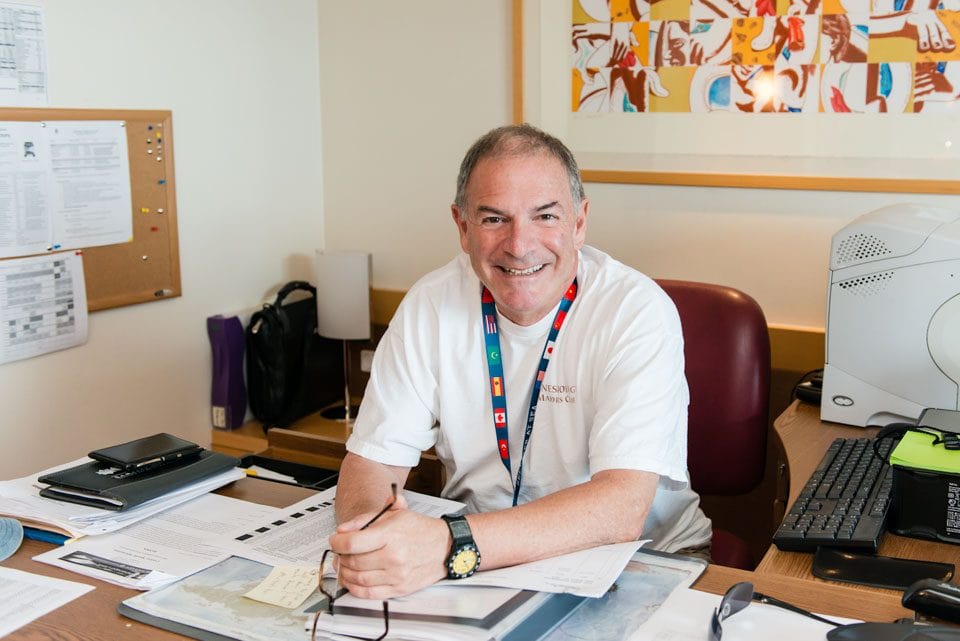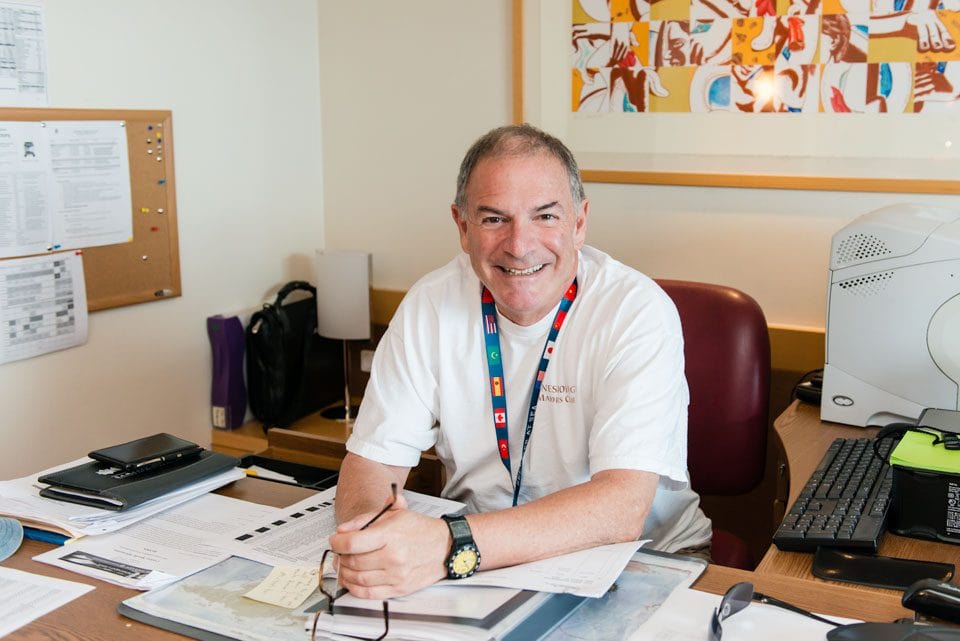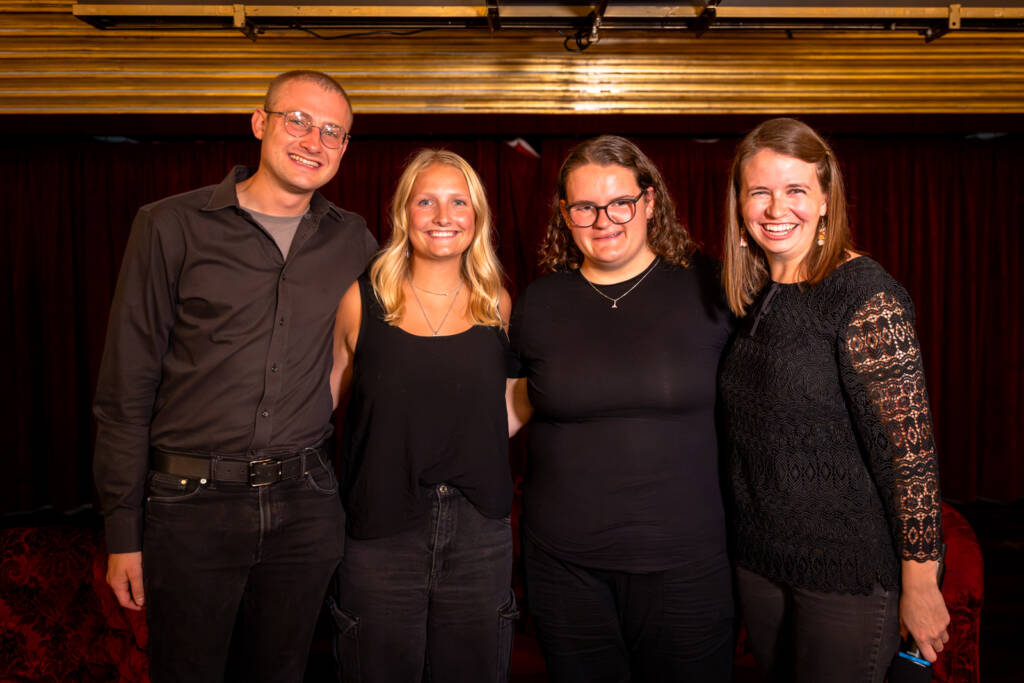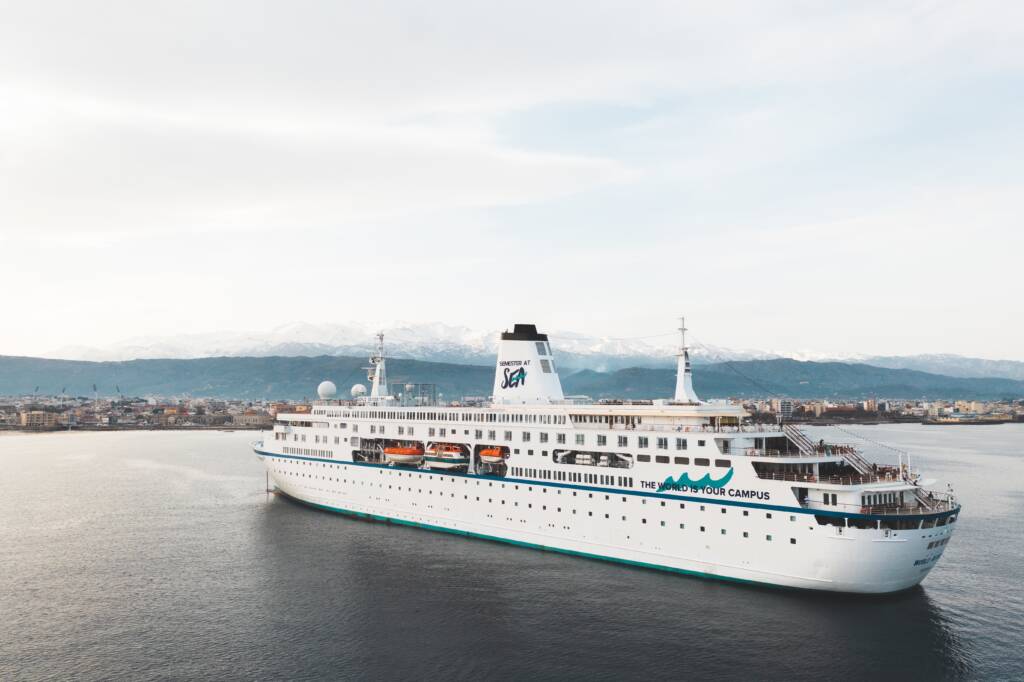 Semester at Sea (SAS) Fall 2013 Executive Dean Nick Iammarino is no stranger to travel nor to Semester at Sea. His passports have stamps from over 60 different countries around the world on nearly every continent (with the exception of Antarctica). The Fall 2013 voyage marks Dean Nick’s third full voyage with the program and his second time as Executive Dean. Dean Nick says that he is a traveler at heart and has found a home with SAS. Here, he can weave his love of adventure with his interest in education, and build friendships with fellow explorers around the world. Back in the U.S., Dean Nick is a professor of health sciences and chair of the department of kinesiology at Rice University. He’s also served as a pre-med advisor at Rice for two decades and has been involved in that university’s international programs, establishing its Japanese exchange programs. He’s spent a 35-year career combining his love of teaching with his passion for all things international (languages, travel, culture etc. He credits his extensive travel with teaching him to value experiential learning, serendipity, and the beauty of a fully present, curious mind. A genuinely affable man and enthusiastic intellectual, I spent some time with him in the midst of a busy week aboard the MV Explorer.
Semester at Sea (SAS) Fall 2013 Executive Dean Nick Iammarino is no stranger to travel nor to Semester at Sea. His passports have stamps from over 60 different countries around the world on nearly every continent (with the exception of Antarctica). The Fall 2013 voyage marks Dean Nick’s third full voyage with the program and his second time as Executive Dean. Dean Nick says that he is a traveler at heart and has found a home with SAS. Here, he can weave his love of adventure with his interest in education, and build friendships with fellow explorers around the world. Back in the U.S., Dean Nick is a professor of health sciences and chair of the department of kinesiology at Rice University. He’s also served as a pre-med advisor at Rice for two decades and has been involved in that university’s international programs, establishing its Japanese exchange programs. He’s spent a 35-year career combining his love of teaching with his passion for all things international (languages, travel, culture etc. He credits his extensive travel with teaching him to value experiential learning, serendipity, and the beauty of a fully present, curious mind. A genuinely affable man and enthusiastic intellectual, I spent some time with him in the midst of a busy week aboard the MV Explorer.
Q: How are you adapting to life at sea and life as the Executive Dean?
A: I adapt pretty well to life at sea. That the first week or so, particularly on this voyage because of how fast we hit our first port, is pretty difficult with the confusion in setting up your systems. So, it's not so much life at sea, which is fine. Perhaps it's life as the Executive Dean and getting things established. The logistical things come at you left and right.
The beginning of the voyage is pretty intense because we’re trying to come together as a community. Students are trying to figure out the ship, their classes, and the newness of studying at sea. The faculty and the staff are trying to learn the systems that have been put in place and, in some cases, re-learn them or learn new systems. That requires a lot of meeting so that we can develop a transparent community. Sorting out duties and responsibilities is a daily task the first several weeks.
Q: What’s a typical day like for you as Executive Dean?
A: My morning starts with reading the emails that have come in from the Institute for Shipboard Education (ISE) office in Charlottesville [Virginia]. That’s followed by a daily 9:30 a.m. meeting with our senior administrative staff. There we discuss, not only what has come through from the main office, but also what’s happening with academics, with the registrar, the ship, the captain and crew, and the student life departments. The rest of the day is usually spent following up with any issues that arise from the morning meeting. Eventually, part of my day will be spent walking the ship, talking to students, and trying to keep my finger on the voyage’s pulse. I also spend time with faculty, staff, and lifelong learners in the evenings and at meal hours. I especially enjoy getting to know the students.
Q: How would you say life on the MV Explorer is different from life at home or on a traditional college campus?
A: I would say there are two things. The first is the proximity of one thing to another, your cabin is near your dining hall. There's a short commute. That takes away all the problems of getting from one place to another. If you can't send an email you can run up and down to a deck and knock on somebody's door or leave a note.
The other thing I think is different from being at a home campus is working closely with people on a daily basis. The only real issue with this proximity is that you do need some downtime. Everyone needs it, so most everyone is respectful of it and finding privacy in your cabin or some time to relax is not too difficult.
Q: What are some of your favorite memories of voyages on which you’ve sailed?
A: One of my favorite memories was on my first voyage in 1996. This was on the first sailing of the SS Universe Explorer. ISE was decommissioning the SS Universe, the previous ship for Semester at Sea, and taking it to the scrap yard in India. We just so happened to catch up with the Universe in the Indian Ocean and our ship radioed ahead to them. The Universe, sailing with just a skeleton crew, turned the ship around, and we passed one another in the middle of the night in the Indian Ocean, turning on all the lights and blowing all the horns. For anyone who had been affiliated with Semester at Sea, but perhaps more importantly among the crew members, there wasn't a dry eye. There were people who had sailed [on the Universe] and it had been their home and this was sort of the symbolic hand off. That was pretty impressive.
Q: What makes you keep coming back to SAS?
A: I'm a traveler and travelers like to explore. And I'm also a teacher at heart. And my passion is to combine the two. So, what better place than on Semester at Sea to be able to delight in watching a student body experience these things for the first time that I've already had the pleasure of experiencing. And, also, to help guide the students through them, to enrich their overall experience makes it the best of both worlds.
Q: How do you find something new to do in each port, even if you've been there before?
A: There's the classic way to look things up in guidebooks or online. But, probably, my best experiences have been through serendipity and through simply getting off the beaten path, wandering. I think the best thing you can do is just simply to wander, as long as you’re being safe.
Q: What advice would you give to a student traveling on his or her first voyage?
A: I think I would ask them to unplug. Unplug in every possible way, to digitally unplug, whether that's to try to use your cell phone less, the Internet less, your iPod less. Make use of all your senses while you're here. There's a tendency for us to rationalize, 'Well, I'm taking a bus ride for an hour. I'm just going put my ear phones in and zone out' and you miss things.
It's not just visual. You have to take in the smells and the sounds. You have to soak up the entire countries you’re exploring. And the best way, I think, to get into your experiences, is to detach yourself, by being unplugged, from the U.S. or your home country.
In 1996, on my first experience with Semester at Sea, we didn’t have Internet on board. Having sailed around the world without the Internet and being forced to use snail mail and waiting for mail call in each port, or to run off and find an Internet caf√©, that detachment from home was probably the most powerful thing that I can say happened on a Semester at Sea voyage.
Now, subsequently, we can't turn the clock back, we have to have Internet. But, as much as you can limit your Internet use, I think your experience is going to be a lot better.



